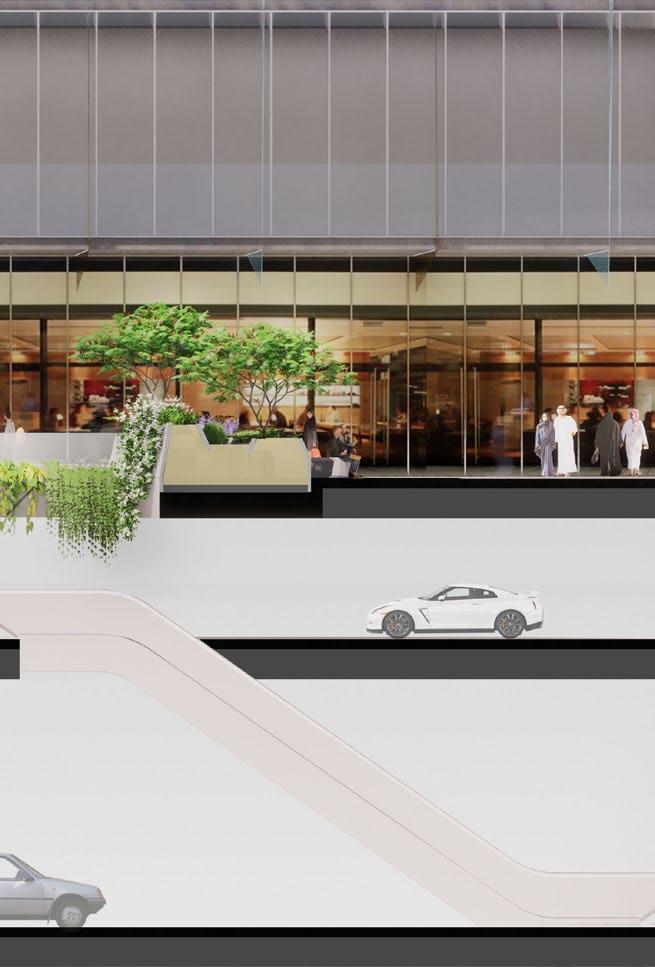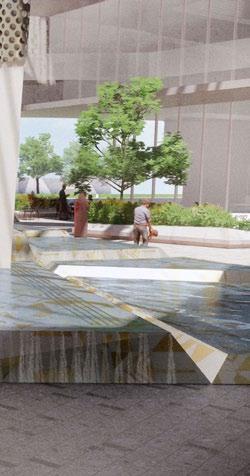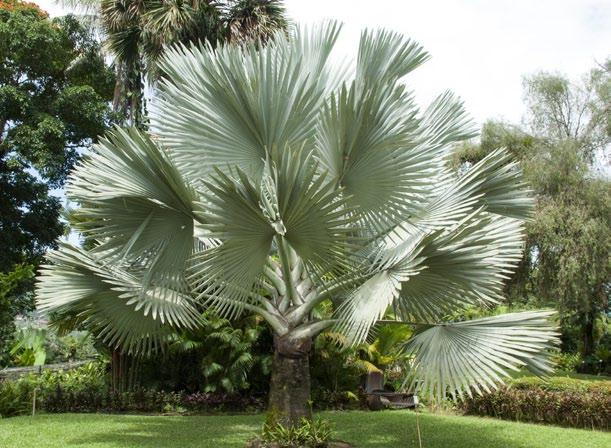
7 minute read
More than a touch of Green
By: Uncommon Land
The blue fan palm, Bismarckia nobilis, is not commonly found on the Arabian Peninsula. Subtropical in origin, angular in structure, glaucous blue in colour, it is one of the many unique tree species selected to enhance a major new development in Riyadh, Saudi Arabia, known as project Solitaire.
Advertisement
Due for completion in 2022, and currently concealed behind a green perimeter wall, Solitaire is set to become an iconic retail destination for the Saudi capital. The scheme, for which Uncommon Land’s sister business Benoy is leading the architecture and interior design, is located in the north of the city and will break from the traditional Riyadhi shopping mall typology to provide a dynamic, open-air environment complete with retail streets, plazas, boutiques and an elevated roof garden.

In a region known to be one of the most arid places on Earth, landscaping, greenspace and biophilia will be critical to the project’s success. These components will also be vital to Solitaire’s alignment with the government’s strategic framework, Saudi Vison 2030.
Billed as “a bold yet achievable blueprint for an ambitious nation”, Vision 2030 is intended to guide Saudi Arabia’s “aspirations towards a new phase of development”.
Central to this vision is a commitment to healthy living and environmental sustainability. Looking to promote balanced lifestyles and new, ecologically friendly ways of driving economic growth, Vision 2030 aims to preserve the country’s natural resources and ensure quality of life for future generations.
For Al-Marqab Investment Company, the client behind project Solitaire, the guiding principles of the 2030 agenda are enshrined in the designs for Riyadh’s new urban retail district. As a representative for Al-Marqab explains:
“Part of Vision 2030 is turning Riyadh into a green area. In the streets, there is lots of planting of new trees. The government is trying to encourage healthy lifestyles for local people, and the planting of trees and greenery is designed to make the environment more liveable. So landscaping is one of the most important elements of Solitaire; it will be key to how the project positions itself and promotes the new concept of environmentally controlled outdoor areas. That is why it is so important to plan and plant it right!”

Striking a balance
The choice of the blue fan palm is a prime example of efforts undertaken by Uncommon Land, the project’s landscape consultants, to do exactly that – to ‘plan and plant it right’. In fact, it is typical of Uncommon Land’s overall strategic approach, which is all about reacting to the nuances of site, climate, geography and architecture.
Benoy’s building design for Solitaire, for example, is based on the crystalline form of the geode; a unique geometry which will inform multiple facades and internal finishes across three levels of interconnected space. The striking frond formations of the Bismarckia nobilis speak directly to the shifting planes of the architecture, while the tree itself meets essential performance criteria.
Looking to create a green and welcoming environment, Uncommon Land’s design team saw that local palm species and native xerophytic plants, such as the barrel cactus, were too static and harsh in appearance. Seeking softer forms which can move in the breeze and react to different light conditions, the team turned to alternative natives from the acacia family and acclimatised species from nearby regions. For the internal gardens, they chose plants with a more Mediterranean profile, such as citrus and olive.
The palette of plants also had to be tempered to incorporate species that will flourish in conditions which are also conducive to human comfort. In this way, the planting strategy had to strike a

balance between the expectations of high-end retail tenants, and the client’s verdant vision for the scheme. On the one hand, retail tenants want good shopfront visibility, clear sight lines, and ambient temperatures in which people are happy to wander, browse and shop. On the other hand, lush greenery thrives in subtropical humidity in which people quickly become hot and bothered. To balance the interests of the client, tenant and end-user, Uncommon Land made astute plant selections that will maximise the green experience without compromising comfort or footfall, helping to ensure both the aesthetic and economic viability of the project.

Wind towers and water features
A unique feature of the development will be its commitment to sustainable cooling via a series of wind towers. Within the towers, mechanical fan systems will help to maintain amenable temperatures throughout the site’s internal zones. The job of these fans will be to move rather than chill the air, producing a sustainable alternative to standard, energy intensive air conditioning.
The aim is to create a comfortable environment via passive cooling technology. And as visitors move from internal zones to external areas open to the climate, forced air systems will ensure they remain protected from the desert heat.
In addition, enticing water features will create a calming look and feel, while also contributing to cooling with their fine mist. The mist will initially feed the ambient humidity, then provide a natural cooling effect as mist-layered objects dry. Overall, the waterfall and stream features will form a key element of the high-quality public realm and respite areas which are the heart and soul of Solitaire.
Crucially, Uncommon Land’s focus on recycled water will ensure the project does not have any detrimental impact on an already water-stressed region. Across all water features and plant irrigation schemes, grey water usage will balance out water requirements in the site’s F&B units, drawing on Riyadh’s civic water recycling system. And once again, the selection of specific drought-tolerant plant species, such as acacia and frangipani, will help to reduce the overall irrigation load.




Sustainability and sense of place
During the design of Solitaire, sustainability and sense of place – both vital ambitions for the project – have become inextricably linked. Aiming to create a rich garden aesthetic, the greening of the project site not only helps to manage challenging climatic conditions, but creates a totally unique destination. Across the north and south plazas and second floor, an immersive, verdant experience is designed to inspire and delight – shaping a drama of green space and a radical new landscape for the people of Riyadh.
Specific sustainability measures have also helped to reinforce the cultural identity of the project. In the contemporary garden zone, the Uncommon Land team removed all corten steel from the retaining wall designs. Knowing that corten steel is unsustainable due to high levels of embodied carbon and heavy-duty construction requirements, Uncommon Land opted instead for brick. Not only does brick have a carbon footprint


roughly 5% that of steel, it also has a much closer regional aesthetic and cultural fit. In an area with a rich history of mudbrick building, the brick walls express a deep appreciation of local craftsmanship and heritage. And an open-weave brickwork structure, combined with solid brickwork elements, allows for a constant flow of air through to the building’s basement levels. Uncommon Land also worked with local highways consultants to reduce traffic volumes around the garden area, which will become the external face of project Solitaire.
Contemporary and collaborative
With extensive landscape experience in the Middle East, plus contemporary design expertise based on a portfolio of show-garden installations, Uncommon Land brings a unique combination of qualities to the table. Offering a different perspective on landscape, the team also has a deep understanding of the singular challenges presented by Middle Eastern geography and climate. Meeting these challenges head-on, the team specialises in using local conditions and circumstances to devise commercially and aesthetically impactful solutions. They are also passionate about addressing these challenges in the context of the broader climate emergency, using design as a vital tool to deliver responsible and sustainable project outcomes.
During the design phase for Solitaire, Uncommon Land, with Benoy, worked hand-in-hand with the key project partners including environmental engineers, Elementa; civil engineers, WME; and lighting designers, Delta. In what was a productive and deeply collaborative process, the partners worked together to navigate multiple project complexities and solve the problems they faced. As the representative for Al-Marqab confirms:
“Despite the disruptions of the Covid-19 pandemic, everyone worked together really well as a team. We had regular virtual meetings. It was a tightly controlled process. And we now have the answers to all our questions – we
have the reassurance we need, and the positive feedback from retailers and prospective clients has been amazing.”
And with construction teams recently breaking ground on site, this truly remarkable landscape and retail project is now underway, promising a green and sustainable future for the city and people of Riyadh.






